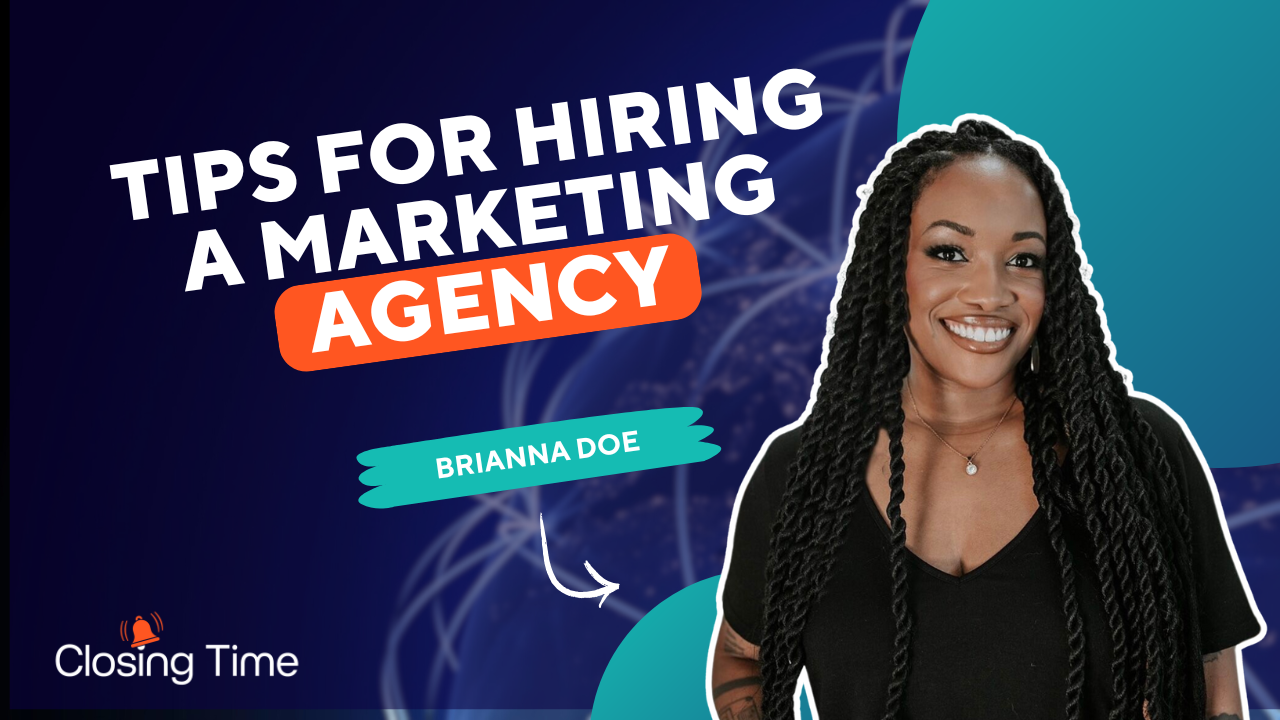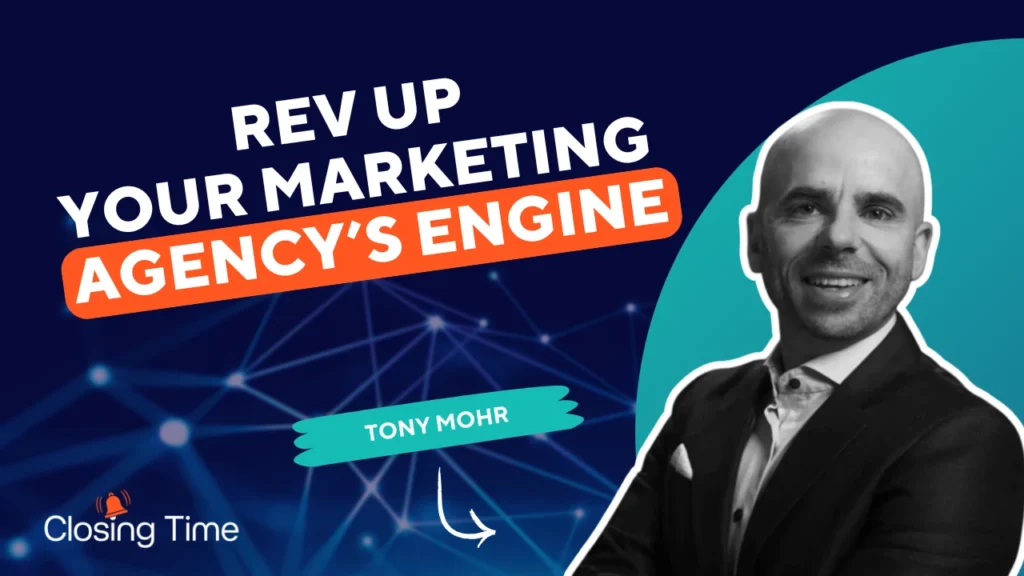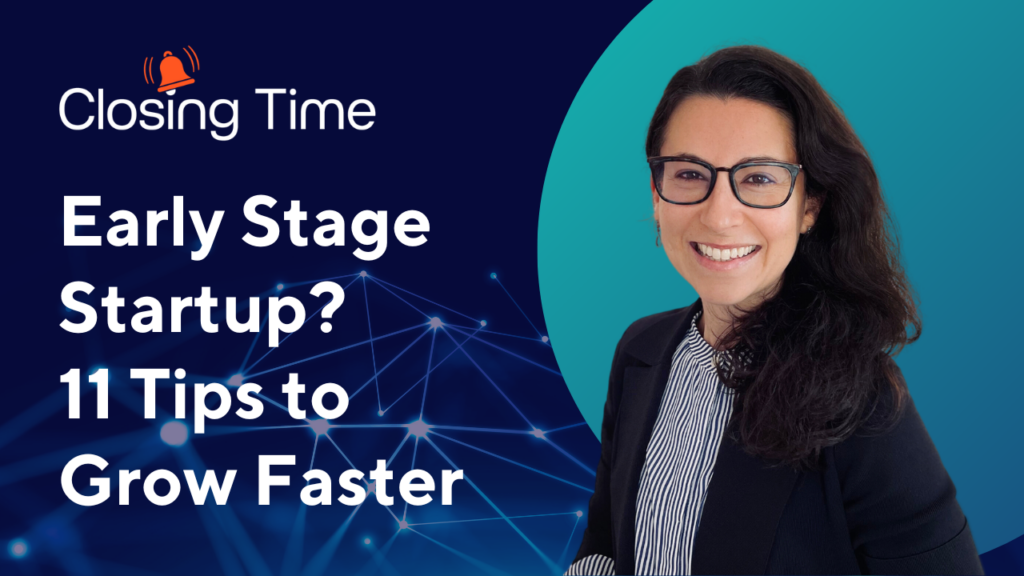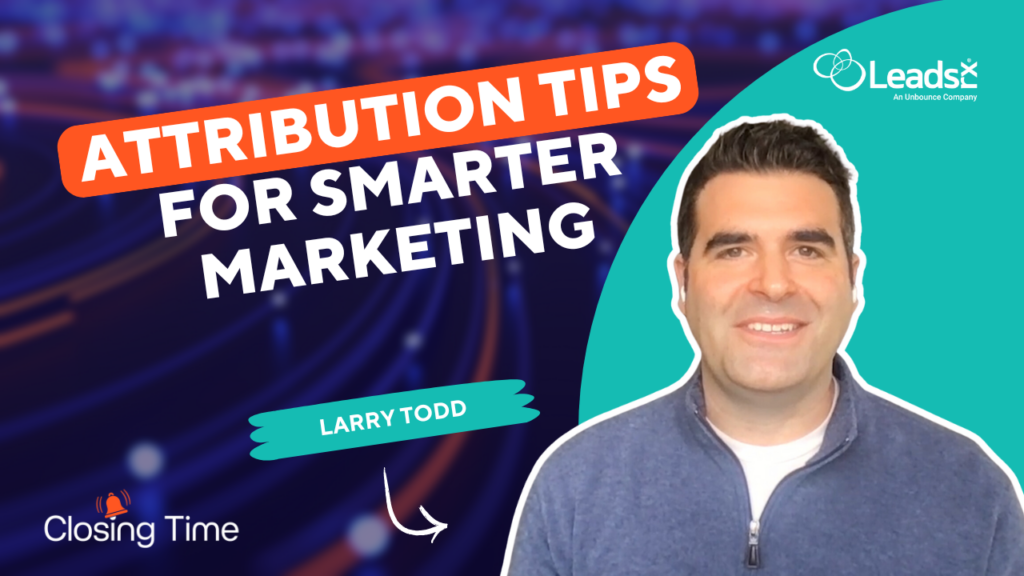Whether you don’t have a marketing team or you’re looking to supplement one,
a marketing agency can be the right lever to pull.
Let’s learn how to navigate the hiring of an agency.
In today’s episode of Closing Time.
Thanks for tuning in to Closing Time, the show for go to market leaders.
Val Riley, VP of marketing for Unbounce and Insightly.
Today, I’m joined by Brianna Doe.
She is the founder of Verbatim, a full service marketing agency.
Thanks for joining us, Brianna.
Thank you so much for having me.
I’ve been looking forward to this. Awesome.
Well,. I’d like for folks to leave this episode
knowing what they should consider when hiring a marketing agency.
So let’s start with the difference between deciding
between a full time marketer or versus an agency.
Like, what are the circumstances like for one versus the other?
Yeah.
I have this conversation often, and it’s a really valid concern
or question to be asking.
One of the first things I recommend looking into is what gaps
are you trying to fill and what problems are you trying to solve?
So if you answer that question with,
you know, three different areas of marketing that you need support in,
or a few different programs that you’re looking to get up off the ground,
you might want to consider the agency approach.
And it also does depend on your budget, right.
If you have the budget to hire one full time marketer or an agency.
We need to be realistic about what one full time marketer can do.
Is it realistic to put, you know, that level of workload on them?
So first things first.
Always figure out what exactly you’re trying to solve
and how an agency or marketer could fit into that.
I like how you mentioned, like, perhaps do like a test campaign and then see.
Okay.. Hey, this campaign worked pretty well.
Now we want to do it.. You know, in perpetuity.
So maybe that means we need to hire someone, right?
Yeah. That too.
So I also see that a lot,
even with clients that I currently have, especially with influencer marketing.
It’s a great example because it’s so new to a lot of B2B brands.
So maybe they’ve done a couple campaigns or maybe they’ve been doing it
for even a year. Right?
And they say, okay, this is working for us.
We see the ROI. We see the impact.
Not quite ready to like, start, you know, building an in-house team for this.
But we do need additional support
to really scale this and get to the point where we can
bring on that internal support.
So it can also be a bit of a placeholder for lack of a better term.
Right?
Like an agency
can help you scale and grow to the point where you’re ready to hire full time.
Got it.
Let’s talk about the agency use case that I’m most familiar with,
which is using an agency to supplement an existing marketing team.
As. As a marketing team leader.
And I have. My team is, like, 16 people.
We still have things that we just cannot get to.
So when you’re hiring an agency to supplement your team, like, what’s a
tipping point where you’re like, okay, this could be a good solution for us.
That’s a great question.
First things first, I recommend, if you’re not already, have your team
start tracking just how much time they’re spending
on different elements of their work that can be really helpful
not to micromanage them,
but to understand where they’re dedicating most of their energy.
Because what you’ll want to do is look at that information and say,
okay, yes, so-and-so is spending their time where we need them to,
or they’re spending way too much time on this particular task or project.
We should supplement and, you know, hire for that or bring on an agency for that.
So start with understanding where your team is at,
for lack of a better term.
How are they feeling about their workload?
Are you getting done what you actually need to get done?
Are you pushing a lot of projects off?
That’s always a great place to start.
Because you’re going to see if you sit down and analyze your team,
you’re going to start to see
where things are falling through the cracks, perhaps, or where
you’ve pushed one project out six months at a time, or from sprint to sprint.
And that can be really helpful to see if it’s time to bring on an agency.
Yeah.
Sometimes I think about it in terms of like,
hey, can we logically carve this out to someone who has just a little knowledge
of our business and, like, have my team members working on the things
that need a ton of knowledge of our business.
So that could be a deciding factor as well.
Like how how much can you carve something out?
That’s actually a great point to like.
How complex is it?
Because even when I was working in house, and even now,
there were times when we were working on a program
or a project that we understood because it was our team working on it.
We’ve been dealing with it for a while, but communicating that
to like a third party and helping them understand
the complexities of it can be really difficult.
And so that’s a great point.
Like analyze that too and see whether it’s more effective to keep it in-house.
So your firm Verbatim, which, I mean,. I think it’s amazing that you founded
and run this incredible agency.
So congratulations on that.
But Verbatim is a full service agency.
So can you talk a little bit about when a full service
agency makes sense versus maybe more of a boutique agency?
Yeah.
That actually goes back to what I mentioned earlier.
What do you need support with?
So one thing I ran into a lot
is, you know, a client or potential client will come to me and say,
we really need support with the content and SEO, influencer marketing.
We need somebody to handle our paid ads.
And also, do you do web design?
Can you handle the website?
And so that is typically a great opportunity
for to bring on an agency as opposed to a boutique.
Now just for context, people define these in different ways.
They’re not really standardized, but like full service typically
means that the agency offers just a wide range of services.
Like everything I mentioned and more.
Boutique agencies, it can either be they offer maybe like 1 or 2 services,
like they specialize in content, or they specialize in paid advertising
or they can offer more services but be really niche in their target.
Right. We only work with
perfume brands or we only work with food and beverage brands, things like that.
So there are a couple of different ways to look at it.
As you’re looking for an agency, do you want one that specializes
in your industry to want one that specializes in multiple services?
That’s something to consider to.
some marketers might shy away from a full service agency
if they’re shopping for one.
Because there are some false ideas out there.
Like maybe the level of service is lower.
Or maybe they might be a jack of all trades, but master of none.
I’d like to invite you to bust some of those myths for
you know why a full service agency might be the right place for people to go.
Yeah.
And it’s, This might be a little counterintuitive, considering
I own one, but I do understand people’s hesitations.
I’ll be honest.
Like when I was working in house and I had the budget
to bring on an agency,. I was also a little hesitant.
For a lot of the reasons you just mentioned. Right.
Like,
okay, are they really going to give me the level of service or care that I need?
Are they good at any of these services or do they just do all of them?
And I think for a lot of marketers,. I’d venture to say that’s
because we’ve had some bad experiences or just some not so great experiences
with agencies in the past.
And so I want to validate that I have my own concerns, too.
And that’s something that I talk about with marketers quite often.
The thing is,
it’s you kind of have to approach it
like you’re hiring a full time marketer, right?
You would interview them, you might even have a test assignment, right?
Or a test project.
You get to know them.
Sometimes you even get references.
It’s the same thing with an agency.
There are great full service agencies out there.
They’re also some that aren’t so great.
But what you’ll find is if they’ve been in the industry for,
you know, at least a year, they’ll have case studies.
They’ll have people that can maybe give you references.
Depends on the agency.
But there are ways to kind of backtrack and understand
how good they’re at, what they do, what kind of service and quality
you’ll be met with,
and if they’ll, you know, meet or even exceed your expectations.
But interviewing them is crucial.
I am always fascinated when I have a call with a potential client.
20 minutes and they’re ready to go.
They’re ready to sign. It’s great.
I love it.
But, you know, there is value in having multiple calls.
And that’s totally okay.
I actually worked for a couple of agencies back in the 1990s.
You probably were in middle school or elementary school, so let’s not go there.
But, But I loved the work, but I, I felt this prevailing attitude
when when you work for an agency,
it’s always like, what have you done for me lately?
You know, you’re only as good as your last campaign or your last clip,
and it it just feels like it’s never enough.
In your experience, like, what’s really going on there?
If that’s if that’s the feeling that you’re getting at an agency with a client.
Yeah. Communication is a huge one.
It’s funny, I actually hear that quite often, and I experienced that too
when I worked in house and when I worked at a couple of agencies.
It’s one of those things where I think it’s a little challenging
because they’re not technically a part of your internal team.
Right.. Maybe you’re in a slack channel together.
Maybe you mostly communicate via email or whatever the case may be.
It’s like the default can be to communicate a little, a little less.
And I think it’s really important to level set and set expectations
when you first begin your work together,
and to check in along the way over the course of that engagement or partnership.
Because even for me,
like this was a growing opportunity for me when I first launched Verbatim,
I, you know, we set up our slack channel with the client and it was going well,
I was sending I think it was like biweekly recaps at that point.
And during one of our checking calls, the client said,
hey, I feel like I don’t know what’s going on.
Which was surprising, right?
Sending the biweekly recaps.
You know, we’re talking via slack.
But what I realized when I dug into it and ask more questions was
that just isn’t the way they communicate.
It’s not the way that they absorb the information.
And so we started sending more frequent recaps.
We went through the recaps on the calls, send the recaps, be a slack.
And so I say all that to say, it’s really important as either
the agency leader or as the marketer
or the brand, to understand how the other one operates,
and also be proactive about explaining how you operate right, how you communicate,
what good looks like and what great looks like.
Because to be honest, if I’m hiring or bringing on an agency,
I don’t want to have to look for another 1 in 6 months because it didn’t work out.
And an agency doesn’t want to have to, you know, off board a client.
And so setting both parties up for success, I think, really starts
with those initial calls where you just communicate about how you communicate.
It’s funny because I feel like I’m the antithesis of that client.
So we work with a PR firm, and they were sending us
these fancy formatted reports every month, and I said,
you know, please don’t waste your time on that.
I know you guys are doing great work.
We communicate in slack all the time.
Just take those couple of hours and, you know, pitch one more pub,
you know, like, I don’t. I don’t need that type of communication,
but I imagine it varies quite a bit per client.
It does.
And for me personally,. I think that’s the fun
part, is getting to know each personality that you’re working with.
But that’s a perfect example. I mean, two
very different
experiences and different, you know, expectations.
So thinking about hiring an agency,
what’s a reasonable budget to have in mind when you’re when you’re in the market?
Is is there a floor like is there a basic amount that you said,
well, if you don’t have at least this much, it’s probably not going to work.
Yeah. That is the million dollar question.
Pun intended, I guess, but so it really depends on a few things.
What problems are services you’re looking for?
Is it a wide range like we talked about earlier?
Is it one.
Are you looking for an agency that specializes in your industry
or in your niche?
There’s multiple things to consider.
I will say,
generally speaking,. I would recommend if you don’t have
at least $3K to spend for like a boutique,
one service shop, things like that, you’re probably not.
It’s probably not the right time to bring on an agency.
Maybe you start with freelancers or contractors
and start to scale whatever program or, you know, area of marketing.
That is when you’re talking full service.
Generally speaking, this can vary, but
what I’ve seen is you’ll need to budget at least $10K per month.
And I say that because you can probably find a full service agency for less.
To be honest, and I think there’s a balance between,
you know, affordable and realistic for the workload.
But to a great extent with agencies,. I’d be curious about your opinion too,
you get what you pay for.
And so I think that’s where the interviews really come
in, really understanding the work that they do, how they do it.
Reading through the case studies and understanding if they’ll meet
your expectations, to justify their costs.
I like your approach there.
It’s not no.
It’s just, maybe not yet or not now.
If you don’t quite have the budget, right,
you can talk to some agencies and feel it out.
But if if your investment level just isn’t high enough, maybe you just need to wait
6 or 8 months or or, you know, get to a point where you have,
revenue growth, where you can squeeze out a few more dollars in your budget.
Yeah, exactly. And that’s totally okay.
I actually have clients who we had our first call when Verbatim first launched.
It wasn’t a good fit.
They didn’t have the budget for it.
A year later, we’re working together.
And so I think being willing to step back, like I said, bring on freelancers,
contractors, scale it more and get the revenue to a point
where that is comfortable to spend and invest.
That’s that’s more important than anything.
I, I never want one of my clients or any agency’s clients, really,
to be in a position where
they’re struggling to get the funds to pay and invest in this agency every month.
That’s really stressful.
Okay.
So let’s say we’ve convinced someone out
there that they should find an agency to help them out.
Where do you typically suggest people look to find an agency?
Yes. So before anything else, start with your network.
Who do you know and trust in your industry,
in an adjacent industry, and ask them if they’ve ever worked with an agency.
Are there some that they’d recommend, maybe some that they’d stay away from,
but more importantly, some of they’d recommend
any recommendations or referrals you can get?
I always recommend starting with your networking.
Who you know, word of mouth referrals.
There’s just so much more credibility with them.
So start there.
And then outside of that,
if you’re in any communities like sales communities, marketing communities,
that’s a perfect place to just throw out the question.
If you know specifically what kind of agency you’re looking forward to.
So, hey, SEO or content agency
specializes
in X, Y, and Z, anybody have good recommendations?
That’s where we go next.
There are also like agency marketplaces like Breef, and Vendry, things like that.
But like I said,. I always go with word of mouth first.
Awesome. Brianna, this was a great talk.
Thanks so much for joining us on Closing. Time.
Where can folks find you if they want to learn more about your work?
Well, thank you for having me.. This is great.
And you can find me on LinkedIn at Brianna Doe or my agency website.
WeAreVerbatim.com.
Awesome.
Thanks to all of you for tuning in to Closing Time.
Remember, you can get this show delivered right to your inbox with our newsletter.
Click the show notes right now
and you can find clips on Insightly’s social channels.
We will see you next week.







